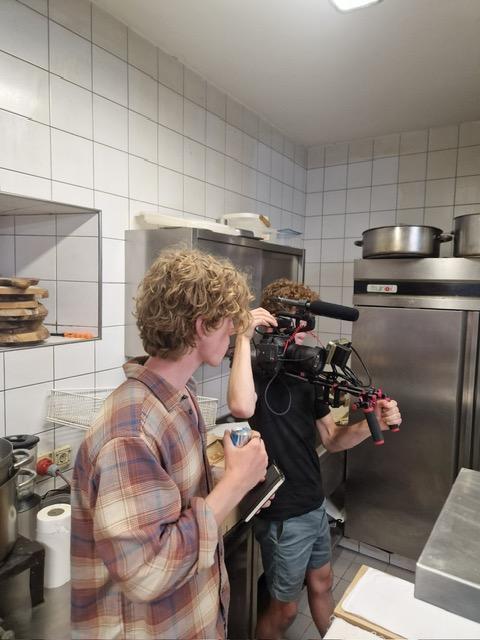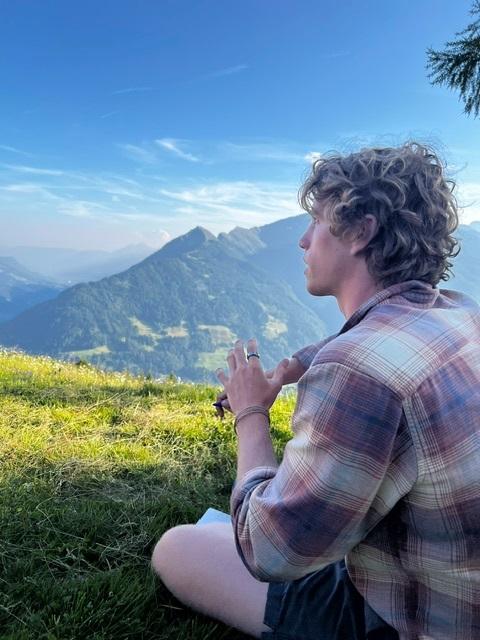Enrosadira: A Student Film in the Dolomites

The Department of French and Italian is proud to have supported the documentary Enrosadira, created by students Al Potter ‘27 (minoring in Italian) and Jansen Look ‘27 in the Italian Dolomites. As the students put it, “Our film is an artsy, anthropological approach to an old armchair philosophy: the sublime.”
“Kant and others believed that in nature we may experience the beautiful—the joyful harmony incited when looking at a pretty flower or rolling hills—but we may also experience a feeling of awe and grandeur when looking over the grand canyon, a towering mountain, or the ocean,” they explained. “In these awe-like experiences, our senses fail to grasp the object of perception and it can be scary—think about the overwhelming sensation of looking over the infinitude of the ocean. Yet, there is also some level of attraction to being lost in our senses, something that keeps us looking.”
 Jansen Look interviewing Caroline & Walter Moosmair.
Jansen Look interviewing Caroline & Walter Moosmair.
The Ladins, a community historically isolated in the Dolomites, became the test case for their research question: do powerful experiences in nature impact one's spiritual life in any sense similar to what Kant claimed?
To carry out the project, they engaged a professional producer, Leonardo Pistolato of Albolina Film, who generously offered his services pro bono. “He helped us secure interviews with locals and navigate the challenging realities of the region, from the language to the geography,” they explained. Additionally, Canon USA provided them with professional cinematography equipment at no cost.
The work was intensely personal. “We spent our days interviewing farmers, religious figures, artists, and historians. Although each person had a different take on our research question, everyone related to it in some way: historians spoke of folktales based on sublime experience, farmers spoke of a connection to their land when looking over the jagged peaks, and artists talked about finding inspiration for their art by spending time in the mountains.”
As the film took shape, so did its argument. “Our film is an argument, constructed over many conversations with people who are constantly overwhelmed by nature, and come upon some epiphany because of it,” they wrote. “There is something about being overwhelmed by nature that forces us to think differently. Al and I, and definitely Kant, believe that these epiphanies are in some sense more noble than just another thought, however we don’t dance with rigorous logic in this film.”
The process of making Enrosadira was as formative as the philosophical questions it raises. “This project has been an immense challenge to bring together, taking over a year of pre-production to raise money and establish an effective project outline. Once in Italy, we worked tirelessly to find people willing to talk to us on camera. Dozens of emails, Small World work sessions, and Zoom meetings were required to engage the people whose support made this possible.” The lessons, they added, included how to create a project proposal, raise money, rent equipment, organize travel logistics, operate film equipment, navigate language barriers, drive along mountain passes, back up storage drives, and edit thirty hours of footage.
 Another view from Moosmair's home.
Another view from Moosmair's home.
The strain was real, but so was the joy. “Producing a film with just two people has not been easy, but it has been one of the most fun, rewarding, and unbelievable experiences we have ever had. There is nothing quite like constructing a philosophical argument out of interviews and b-roll, all in the rural, Italian Dolomites.”
Currently in post-production, the film is expected to be finished in April. “We look forward to sharing more details as we get closer to that date,” they said, adding, “Finally, there are countless individuals to thank for their contributions to our project, but to name a few, a huge thank you to the French and Italian Department, Fred Fox at the Office of Religious Life, Canon USA, and Leonardo Pistolato at Albolina Film.”
